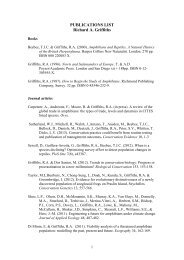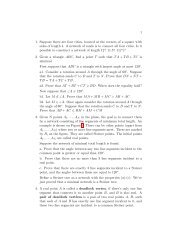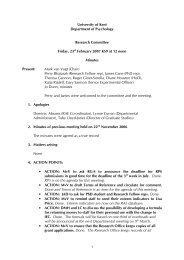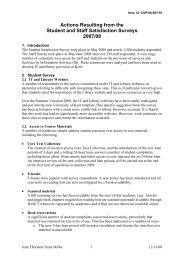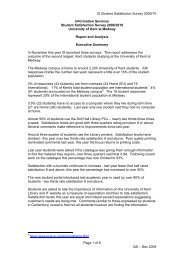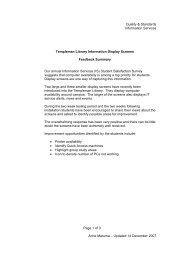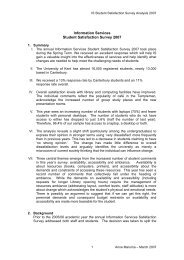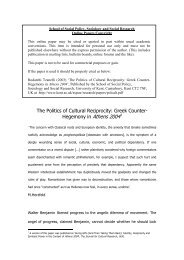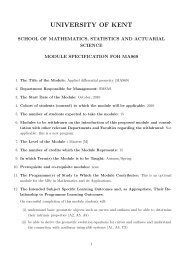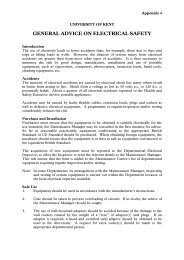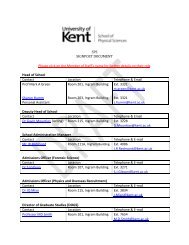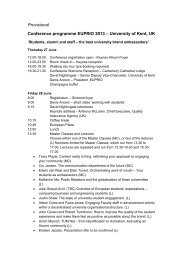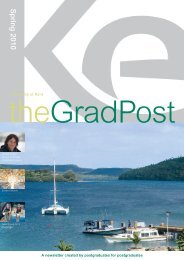Spring 2004 - University of Kent
Spring 2004 - University of Kent
Spring 2004 - University of Kent
You also want an ePaper? Increase the reach of your titles
YUMPU automatically turns print PDFs into web optimized ePapers that Google loves.
Families and children<br />
Children and the issues around<br />
them are the subject <strong>of</strong> much<br />
academic work at <strong>Kent</strong>, and as<br />
a research area, cross faculty and<br />
department boundaries. Topics<br />
range from the care <strong>of</strong> children<br />
with disabilities, to prejudice in<br />
children, to the costs and<br />
practicalities <strong>of</strong> care and<br />
approaches to autism and<br />
dyspraxia. Following is a tiny<br />
sample <strong>of</strong> ongoing work on<br />
children-related subjects at <strong>Kent</strong>.<br />
Sociology: working children<br />
What jobs do children perform in ethnic<br />
businesses and on behalf <strong>of</strong> their parents?<br />
How do they understand and experience their<br />
labour? In her book, Helping Out, by Dr Miri<br />
Song, Senior Lecturer in Sociology at <strong>Kent</strong>,<br />
addressed the centrality <strong>of</strong> children’s labour<br />
participation in various family-based ethnic<br />
enterprises. Discussing the case <strong>of</strong> Chinese<br />
families running take-away food businesses in<br />
Britain, Dr Song examined how children<br />
contribute their labour and the context in<br />
which they come to believe in ‘helping out’ as<br />
part <strong>of</strong> a ‘family – work contract.’ Many young<br />
people, such as Anna, are aware <strong>of</strong> their<br />
importance to the viability <strong>of</strong> the business:<br />
‘You knew your parents depended upon you.<br />
Half the reason they were pleased to have kids<br />
was that they needed them to maintain the<br />
business, and their lives got easier as you grew<br />
older and took on more responsibility. I just<br />
feel that my<br />
mum and dad<br />
could never<br />
have had a<br />
shop <strong>of</strong> their<br />
own and not<br />
had children.’<br />
12<br />
Studies about<br />
ethnic<br />
businesses –<br />
which usually<br />
concentrate on<br />
their relevance<br />
to immigrant adaptation – have rarely<br />
examined the work roles, family dynamics,<br />
attitudes, and experiences <strong>of</strong> the people<br />
involved. Song explored the implications <strong>of</strong><br />
these children’s labour for family relationships,<br />
the formation <strong>of</strong> cultural identity, and the future<br />
<strong>of</strong> the Chinese community in Britain. She<br />
argues that the practical importance and<br />
broader meanings <strong>of</strong> children’s work must be<br />
understood in the context <strong>of</strong> immigrant<br />
families’ experiences <strong>of</strong> immigration, social and<br />
economic marginality, and racism in Western,<br />
white – majority societies.<br />
Paranoid parenting<br />
Dr Frank Furedi, Pr<strong>of</strong>essor <strong>of</strong> Sociology, has<br />
written numerous articles in the popular press<br />
on childcare, and his book, Paranoid Parenting,<br />
has been widely<br />
acclaimed by<br />
parents and<br />
childcare<br />
pr<strong>of</strong>essionals.<br />
Hardly a day<br />
goes by without<br />
parents being<br />
warned <strong>of</strong> a<br />
new danger to<br />
their children’s<br />
wellbeing. Highpr<strong>of</strong>ile<br />
campaigns<br />
convince us that our children’s health, safety<br />
and development are constantly at risk. It is<br />
hardly surprising that parents become<br />
paranoid, afraid to let their children out <strong>of</strong><br />
their sight. Even then, they are criticised by<br />
one childcare expert or another. It seems that<br />
parents can do nothing right. Parents do not<br />
know whom they can trust, but one thing is<br />
made clear to them – they cannot trust their<br />
own judgement. Paranoid Parenting investigates<br />
contemporary parental anxieties and suggests<br />
that these fears are themselves the most<br />
damaging influence upon children in modern<br />
society. Children are actually physically safer<br />
than they have ever been before and perhaps<br />
more in danger from the conflicting advice<br />
handed out to parents by different<br />
generations <strong>of</strong> ‘childcare experts’. Frank<br />
Furedi explains why parents feel paranoid and<br />
looks at how they can deal with the insecurity<br />
that is fostered by experts and the media. He<br />
goes on to give examples and build a case for<br />
parents relying more on their own judgement<br />
and circumstances.<br />
Psychology: how kids decide who’s in<br />
the ‘In Crowd’<br />
Researchers have long known that children<br />
<strong>of</strong>ten dislike non-conformists. As they get<br />
older, however, they learn to judge others as<br />
individuals. Psychologists at <strong>Kent</strong> conducted a<br />
study to test that theory. Pr<strong>of</strong>essor Dominic<br />
Abrams, Dr Adam Rutland and colleagues<br />
questioned 476 English children, aged 5 to 11,<br />
in the run up to the 2002 World Cup finals.<br />
Pr<strong>of</strong>essor Abrams: ‘We first asked them how<br />
they felt about the English and German teams.<br />
Not surprisingly, children <strong>of</strong> all ages showed a<br />
strong preference for the English team.<br />
‘Then we introduced two imaginary figures,<br />
Alex and Mark. Alex was either an Englishman<br />
who supported England or a German who<br />
supported Germany. The children considered<br />
Alex normal. Mark was introduced as either a<br />
British or a German person who would cheer<br />
for either team when they played well. The<br />
children judged Mark ‘different’. Children as<br />
young as five can understand the idea <strong>of</strong> loyalty,<br />
at least as far as it deals with sports teams.<br />
‘As they get older, children become more<br />
sensitive to the attitudes <strong>of</strong> their own and<br />
other groups. English children who strongly<br />
support their own team may harshly judge an<br />
English fan who recognizes the strengths <strong>of</strong><br />
both their own and an opposing team.<br />
However, they may accept a similarly openminded<br />
individual who belongs to an opposing<br />
group. This implies that while children continue<br />
to exhibit prejudice as they age, that prejudice



